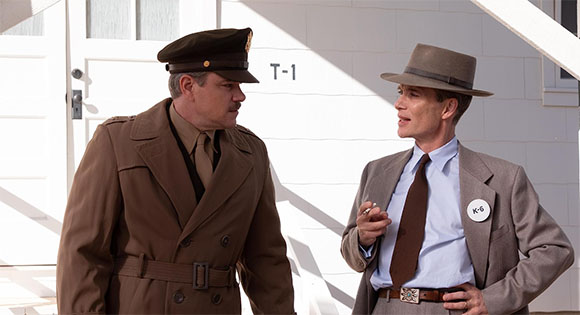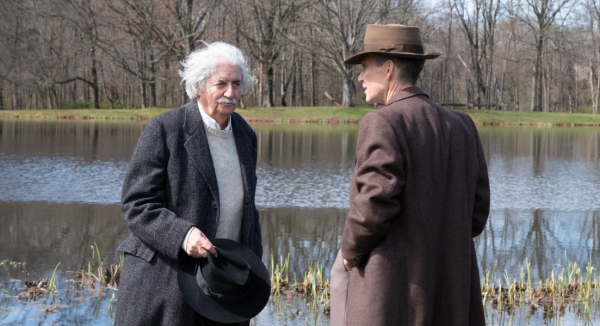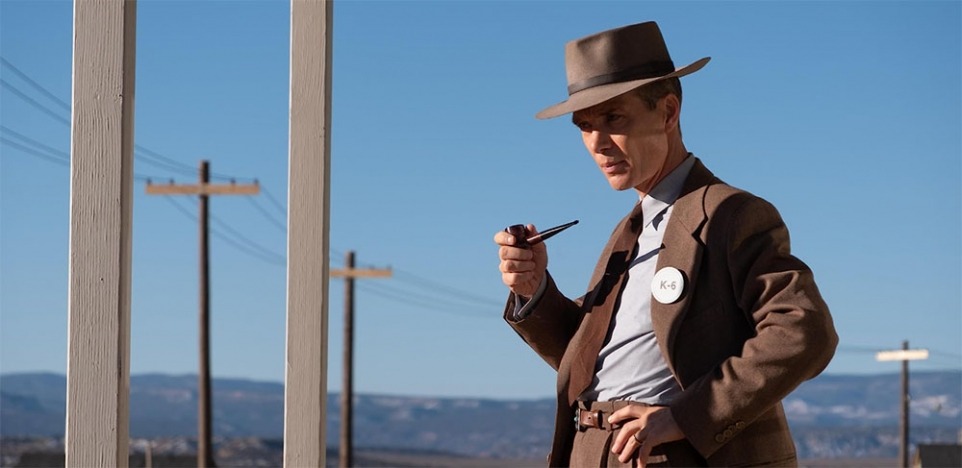Christopher Nolan has expended an enormous amount of creative energy serving as director, producer, and writer of this engrossing biopicture about J. Robert Oppenheimer, the brilliant American theoretical physicist who oversaw the secret Manhattan Project at Los Alamos, New Mexico, to develop an atomic bomb. This bold, intense, inventively filmed, and well-acted thriller is based on Kai Bird and Martin J. Sherwin’s Pulitzer Prize-winning 2005 biography, American Prometheus: The Triumph and Tragedy of J. Robert Oppenheimer.
In a scene in the film, Oppenheimer (Cillian Murphy) and the Los Alamos community are waiting for a test of the bomb they have developed in July 1945. If the test goes well, they expect the atom bomb to be used against Japan in order to end World War II. But they know there is also the possibility that the chain reaction started on ignition might not stop, could go into the atmosphere and destroy the whole world. Looking through a window at the tower holding the bomb, Oppenheimer says: “These things are hard on the heart.”
As if taking off from that line, Nolan has structured his film around two heart-breaking incidents in Oppenheimer’s life. First and foremost, of course, is his role in the development of the bombs that were dropped on Hiroshima on August 6, 1945 and three days later on Nagasaki.
The second incident is a secret hearing held in 1954 to determine whether to revoke Oppenheimer’s security clearance. Supposedly, it was to investigate Oppenheimer’s ties with known Communists early in his career and with suspected disloyal scientists at Los Alamos. But the investigators were also concerned about his outspoken statements against the hydrogen bomb (yet to be developed), his advocacy of arms control and against nuclear proliferation, and his concerns about the arms race during the Cold War with Russia. How could the “father of the bomb” end up opposed to it?

Nolan has chosen to film the scenes of the hearing in black-and-white (as if such confrontations could ever be that simple). Through Oppenheimer’s own and others’ testimonies, we learn of his studies at Harvard, Cambridge, and the University of Gottingen in Germany, and his later position as lead physicist at Berkeley. We see him interacting with his brother Frank (Dylan Arnold) and his girlfriend Jean Tatlock (Florence Pugh), both members of the Community Party. His wife Kitty (Emily Blunt) also had Communist ties, though she affirms that her husband had never joined the party.
In flashbacks to key moments of his career, we see Oppenheimer interacting with scientists Niles Bohr (Kenneth Branagh) and Albert Einstein (Tom Conti). We observe his relationship with General Leslie Groves (Matt Damon), the government watchdog over the three-year, $2 billion Manhattan Project. We also see the development of a rivalry with Lewis Strauss (Robert Downey, Jr.) who was instrumental in pushing for the security hearing.
Throughout the film, Cillian Murphy seems to literally embody the mental genius and pained emotional and ethical presence of the pioneering physicist and persecuted anti-nuclear activist. His amazing performance sweeps across 40 years of academic competition, political chicanery, courtroom drama, espionage, right-wing paranoia, antisemitism, technological advance, and ethical debate.

Nolan’s script gives us plenty of lines to ponder and discuss:
Said to Oppenheimer: “You see beyond the world we live in. There is a price to pay for that.”
Oppenheimer at Los Alamos: “Our work here will ensure a peace the world has never seen.”
Niles Bohr to Oppenheimer: “You are the man who gave them the power to destroy themselves, and the world is not prepared.”
Einstein: “This isn’t a new weapon. It’s a new world.”
The way the man changed over the years is conveyed by this story:
“Long after he became one of the strongest opponents of the development of the hydrogen bombs on both technical and moral grounds, Oppenheimer is said to have been have walking in the woods one day with a friend. He came across a land turtle, and thinking it would make a nice surprise for his grandson back at the house, he picked it up to carry it home. But just a few meters along the path, he stopped abruptly, turned back and placed the turtle on the ground precisely where he had picked it up. He remarked to his friend: I have interfered with life enough for one man’s lifetime.”
— from Waking Up to What You Do by Diane Eshin Rizzetto
